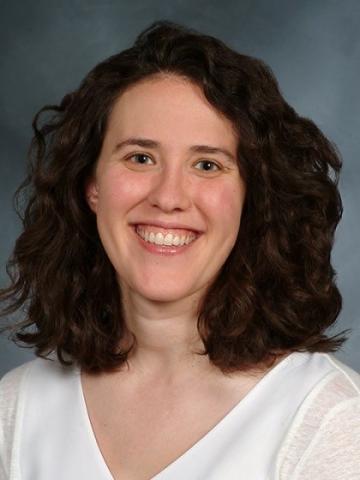- Clinical Care
- Education
- Centers
- Research
Group Peer Mentoring (GPM) Program is a faculty development program lead by Kimberly Bloom-Feshbach, M.D. for Weill Cornell Medicine faculty.
The GPM program was co-founded by Drs. Bloom-Feshbach and Swana de Gijsel in 2021. We thank Amina Knowlan, MSc for her close collaboration. GPM sessions are facilitated by Weill Cornell Medicine faculty who have successfully completed the Weill Cornell Medicine Facilitator-in-Training for Group Peer Mentoring (FIT-PM) program.
Facilitated group peer mentoring is shown to lead to career advancement, improve physician vitality, and foster a community dedicated to scholarship. We offer opportunities for a range of faculty, including early and mid-career researchers, clinician-educators, leaders in medical education, and experienced faculty.
In this program, participants will:
Develop a career vision aligned with your core values, strengths, and identities
Create individually designed goals and plans for personal and professional development
Learn mentoring skills to help others define their goals and achieve their plans
Harness best practices for leadership and teamwork
Gain enhanced meaning in work within a scholarly community
Tuition will be fully sponsored thanks to the generous support of the Dean's Office.
| Weill Cornell Medicine Faculty Wednesdays: | 10/29/2025 12/10/2025 02/25/2026 05/13/2026 |
| Weill Cornell Medicine Faculty Thursdays: | 10/16/2025 12/11/2025 02/26/2026 05/28/2026 |
| Weill Cornell Medicine Faculty Fridays: | 10/17/2025 12/05/2025 02/27/2026 05/15/2026 |
To apply, please complete this application by July 30th, 2025 at noon EST. The application includes completing a brief survey regarding your interest in the program. Applicants will be selected and notified on a rolling basis by August 1st, 2025. Groups are open to faculty regardless of gender, race, ethnicity, age, disability, sexual orientation, gender identity or expression, or national origin.
If you have questions about this program, please contact Faudia Pasha, MHA, Project Coordinator for the Group Peer Mentoring Program or Kimberly Bloom-Feshbach, MD.
“Learning in the group is applicable to every aspect of our lives, not limited to our professional career. We are considered as whole individuals. All our identities are recognized, valued, and considered at every mentoring session. The approach is unique, so I have learned a great deal so far. Also, the environment is incredibly welcoming, so it is very easy to open and discuss even the most difficult topics.”
“I really appreciated the program and found it great to get to know colleagues across the institution. I was able to get feedback on a scholarly piece I was working on from two members of the group. I could tell that colleagues in many departments were really missing exactly the community that GPM fostered.”
“It’s been great to connect with people throughout the institution who I didn’t know well. It’s very helpful to hive mind and brainstorm for people. Often our struggles are shared, and wisdom can also be shared.”
“Following a curriculum that allows me to connect with myself. Homework assignments with a partner to keep me accountable. Relaxed, supportive tone of the emails/meetings that encourages growth through reflective listening. Connections with other faculty I otherwise would not have likely met. Time to reflect on my career path and change the trajectory. Opportunity to be myself without fear of being judged. Time well spent.”
“Different perspectives from people in different divisions/departments. Appreciate the frameworks and concrete tools provided for planning goals.”
“It is helpful to realize that across all disciplines in the hospital, people are largely feeling under-mentored. I feel less alone in this regard and more aligned with everyone's struggles. If I am not alone then I feel more energized to figure out how to work on the problem, rather than feeling resigned to the reality of the hospital system that isn't providing the best resources for the faculty. GPM really allows us to be open and honest about our struggles and different peers bring different talents, strengths, and helpful ideas to the table.”
“Life-changing program.”

Dr. Kimberly Bloom-Feshbach is an Assistant Professor at Weill Cornell Medical Center in the Division of General Internal Medicine and Section of Hospital Medicine and co-leads the Group Peer Mentoring Program. Dr. Bloom-Feshbach graduated from Yale University, summa cum laude, with a BA in Religious Studies and worked as an epidemiological researcher in the Division of Epidemiology and Population Studies of the Fogarty International Center of the National Institutes of Health, collaborating with researchers at the Statens Serum Institut and Roskilde University in Denmark. She obtained her medical degree from Icahn School of Medicine at Mount Sinai, followed by Internal Medicine Internship and Residency at Brigham and Women's Hospital of Harvard Medical School before joining the faculty at Weill Cornell Medicine. As a physician, medical educator and investigator, Dr. Bloom-Feshbach designs and evaluates communication and mentoring strategies with the goals of increasing humanism, vitality, and diversity in medicine. She enjoys caring for hospitalized patients at NewYork-Presbyterian/Cornell Medical Center and Lower Manhattan. In addition, Dr. Bloom-Feshbach is a co-investigator with the C-Change Mentoring and Leadership Study, a five-year NIH-funded study based out of Brandeis. At Weill Cornell Medicine, she designs and evaluates medical education curricula from the medical student through faculty development level. She directs the Patient Care and Physicianship curriculum for pre-clinical second year medical students and serves as the Director of the Virtual Hospitalist Program at Weill Cornell Medicine and the Associate Director of Medical Services at NewYork-Presbyterian/Westchester Behavioral Health Center. Dr. Bloom-Feshbach is also Senior Faculty with Vital Talk, teaching serious illness communication skills to clinicians at Weill Cornell Medicine and beyond.